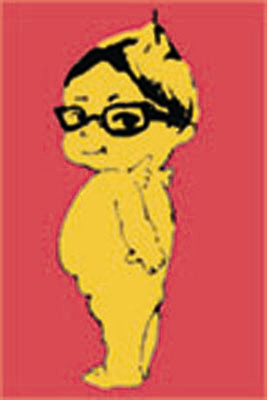Akira MIYAMA
Administrative staff member
Delta G (www.delta-g.org)
【The article below is the same as the article that appears in the tenth issue of the CGS Newsletter.】

While the equation “women-loving women = lesbians” may function as a convenient logic for heterosexuals to categorize the unknown, incomprehensible other so they don’t have to think about it anymore, it can cause confusion and dilemmas for the women concerned. That is because a romantic/erotic experience a woman may have with another woman (or other women) does not necessarily always lead to a lesbian identity. The same is true for gender identity and national identity. Having a biologically female or male body does not always lead to a female or male identity, nor does having Japanese nationality (or having been raised in Japan) necessarily lead to a Japanese identity. To those who do not see how this kind of discontinuity works, my words probably mean nothing.
So where does my discomfort come from? Why do I feel upset and uncomfortable when expected to speak from the lesbian perspective? I think it’s because I am torn between loneliness (“no one understands the diversity among lesbians”) and hope (“there must be SOMEONE who understands!”). It’s tremendously exhausting. I can’t speak because I can’t stand the idea of my words being categorized as “one lesbian’s opinion” and simplistically summarized as “everybody is different.”
Even if I say all I can, some things will always be lost and forgotten en route to the other person. I get scared every time I speak up. But I’ll turn that fear into courage. I won’t stop speaking the unspeakable --- never.
Although it is impossible for me to write in this article everything that I think of lesbians, the most important thing I have to tell you is there is a huge difference between “lesbians” and me. I do not fit in the category. It is not enough to share the same kind of sexual orientation. At times, my own objectives may contradict the objectives of “lesbians.” There may also be times when something which has been done for all lesbians cause trouble or confusion in my personal life.
 “But,” you might say, “the same is true for everybody else. Not only lesbians go through that.” But so what? Just because everybody goes through it, it's not an important issue? You shouldn’t worry about it? No further discussion would be possible if you just conclude that everyone’s the same so everything’s all right.
“But,” you might say, “the same is true for everybody else. Not only lesbians go through that.” But so what? Just because everybody goes through it, it's not an important issue? You shouldn’t worry about it? No further discussion would be possible if you just conclude that everyone’s the same so everything’s all right.
I know what I am saying here is very stubborn, offensive, and biased. I understand how this can create a negative image of lesbians. But I don’t care. If you are one of those who have a strong sense of lesbian identity and have gained self-confidence and higher self-esteem by coming out as lesbian, this article might counteract the kind of empowerment you experienced. But to me, personally, it is nothing but deception to empower people without dealing with the deeper issues surrounding them that they dare not discuss. This is closely linked to why I feel happy that I am a lesbian and how I came to take on the “lesbian” categorization.
We often hear such remarks as “he’s gay” and “she must be lesbian.” Indeed, it is wrong and rude to judge other people’s sexuality based on stereotypes. But what I personally find even more unforgivable is when a self-professed lesbian declares, "that woman is not a‘true’ lesbian.” As I already mentioned, being a lesbian is not exactly the same as being attracted to women as a woman. A woman may not perceive herself as lesbian even if she is romantically or sexually involved with a woman. Other women might identify themselves as lesbians even when they are romantically or sexually involved with men, or even if they have never had any sexual experience at all. Indeed, while a sexual or romantic attraction to women can trigger a woman’s identification as a lesbian, it is not the determining factor.
As for me, I have no gender identity (yet) and I am polysexual (gender doesn’t matter in relationships), single-oriented and polyamorous. Being a lesbian is not my only identity. No one word can describe anyone’s whole being. Yet, I accept the term “lesbian” because lesbian identity is inextricably linked to my other identities; moreover, I hope for the liberation of the lesbian identity category. By accepting the name “lesbian,” I began to accept and even love my obstinacy, stubbornness, nervousness, weakness and distrustfulness.
It makes me angry that lesbians are often considered non-existent, that we are not heard but ignored. But every time someone asks me to speak as a lesbian, I can’t trust them. I doubt that they will use my voice to good purpose. They might just try to use it to say they are engaged in political correctness by hearing the otherwise unheard voices of lesbians. That shows how I am a stubborn, distrustful lesbian. But being stubborn and distrustful, to me, is pretty much linked to being a lesbian. That is because conformity means giving in. It was from the experience of being a lesbian that I have learned to be myself, without pretending to be good, forgiving or tolerant.
Why do I have to fight under the rules that you created? Why don’t you fight with me under the rules that I made (let’s see if you can)? Why don’t you stop trying to draw out the silent voices of lesbians and listen to your own silent, hidden voices instead? Why do you feel the need to break the silence of lesbians and not your own?
My silence as a lesbian finds a place of sympathy only with people who listen to their own silence. And that is the only time I would like to lift up the lid of my own silence and share with them the experience of walking on a tightrope as fragile as a spider’s web.